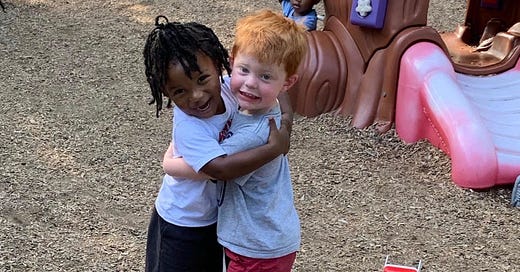An Analogy
One of the reasons zoos and marine parks were founded and continue to this day is that people only value, protect and esteem the lives of wildlife we actually have seen. The fate of some lowly insect or sponge seems meaningless until we have seen its beauty with our own eyes. An amazing thing happened when various African governments started letting their people benefit from tourism. Not only did the tour experience get better, but the people of these countries began to value their animals much more, which lead to less killing. Our hearts open naturally when we know what we have in the people and animals around us.
My Early Encounters with “People Not Like Me”
My parents moved us to Wilmette, IL. In the area we lived in, most people were Jewish, one family was Catholic and we ourselves were mixed Presbyterian and Jewish. Even as a 2nd-grader, I remember kids sharing information on their religions, probably somewhat inaccurately, and delighting in the exchange. As my parents were supporters of equal rights for Blacks, while we rarely met or got to know Blacks, we harbored no particular opinion. Starting out with non-judgment was pretty much the norm back then, at least for my family, my friends and their families.
In 6th grade, we moved to Berkeley, CA. In 1966, the streets were filled with hippies and people holding protests and various other things I had never encountered. Again, the reaction my sister and I had to this was curiosity. We simply wanted to know more about them. Why were they out there? Why did they want to “legalize pot?” We had plenty of pots; in California, they were illegal?
The Natural Curiosity of Children
While there is a natural attempt to establish a hierarchy with children, the kids on the bottom tend to be there because of more random things. Some kids haven’t gotten fully toilet-trained in 1st grade. Other kids had bad habits that caused them to be low-ranked. I was the snively kid who knew all the answers (I had allergies and I was smart, but not smart enough to keep it under control). But even in 6th grade, I never saw anyone decide that race mattered. In fact, our star in Hamlet was a Japanese boy. Everyone liked him (and envied his ability to memorize the part). We had Black and Hispanic children in our school and everyone worked together and played together, unless we didn’t like their personality. Nothing else mattered.
The Harm CRT and Race-Based Spaces Causes
Plessy v Ferguson wrongly decided that as long as everything appears to be “equal,” you can separate people by race. In 1954, Brown v Board of Education reversed that, saying that you do not get the same outcomes when you separate people. Apparently, we have to go through this long process again. But now, the groups being separated are the “oppressors” and the “oppressed.” Children are forced to self-identify as one or the other, depending on their “intersectionality,”. But instead of considering those who are currently oppressed in reality, this is based on race and sexual identification.
First of all, when you separate people, you encourage hate. Why wouldn’t an oppressed kid hate someone identified as his oppressor? But when we think of people as oppressed, it might spark sympathy, but it also makes many see them as less than a full human. This was the problem with earlier separation rulings. We need to think of everyone as our equal (until they prove themselves unworthy of this regard based on their behavior). While separating out kids may seem to “help” them, it doesn’t. In fact, my grammar school mainstreamed us with Down’s Syndrome children, where possible, which helped both of us. I have a deeper appreciation for their challenges, but more importantly, for their great hearts, courage and attitude.
The Presumed Fragility of the “Oppressed”
All this assumes that we need to protect these oppressed children, but what do they think? Most children are tougher even than their parents and while life brings various hurts, telling them they are oppressed only inspires sub-optimal behavior, such as thinking they can’t achieve or feeling they can’t befriend an “oppressor.”
Most psychologists will tell you that you need to find in yourself the strength to overcome adversity. This leads to personal growth and advances achievement. What you protect doesn’t learn to protect itself and doesn’t grow. Kids need to fall down, fail at things and even have people not like them. All this is part of the learning we all have to do to grow up. And they’re up for it. When a child is challenged, if those around believe they can meet that challenge, they do. When they are told they can’t, they give up.
Time to Drop the Pretense
Of course, this is all about somehow reversing history and making White people slaves to Blacks. It’s never going to happen. Instead, the more we interact, the more we find to love in each other. People are born with curiosity and interest in everything around them. Let’s start identifying as people first.





So spot on accurate. Do we truly not know this by now? I guess we don’t. How sad and the children collectively become the victims because of supposed adults. Maybe the children should be in charge.